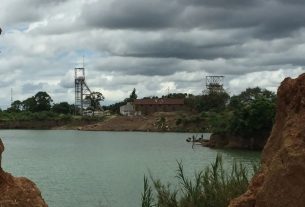Johannesburg, South Africa – In a shocking turn of events, the South African government is facing widespread condemnation for its decision to block rescue operations for miners trapped underground. The miners, who had been working in an unlicensed and illegal mine in the country’s North West province, have been stranded for several days after a collapse occurred at the site. Despite widespread calls for immediate action to save them, authorities have halted rescue efforts, citing legal and safety concerns related to the informal nature of the mine.
The decision to block the rescue of the miners has sparked outrage among activists, trade unions, and the general public. Community leaders are accusing the government of callous indifference and inhumane treatment of the miners, who are largely from impoverished communities and who work in dangerous conditions to support their families.
“These Are Inhumane Practices” – Activists Speak Out
A prominent community activist, speaking to Socialist Worker, expressed outrage over the government’s refusal to allow rescue teams to enter the collapsed mine. “This is an unprecedented and cruel decision. The miners are human beings, and their lives are worth far more than any legal or financial considerations. The state’s actions are nothing short of inhumane practices,” the activist said. “These people are working in these mines out of necessity, and now the government is essentially abandoning them to die underground.”
The activist pointed out that South Africa has a long history of mining accidents, and the lack of sufficient safety measures in both licensed and unlicensed mines is a major issue. However, they argued that when miners find themselves in peril, the state has a moral obligation to intervene, regardless of whether the mine is legal or not. “If the government were truly committed to the safety of workers, they would have provided them with the resources and opportunities to work in safe, legal conditions in the first place,” they said.
Legal and Safety Concerns Cited
The South African government’s rationale for blocking the rescue operation centers on the fact that the mine where the workers were trapped is unlicensed and has been operating illegally. Authorities have argued that sending rescue teams into the mine would pose significant risks, both to the miners and to the rescuers, because of the precarious and unsafe nature of the mine’s structure. The mine has also reportedly been linked to criminal networks involved in illegal mining, which has made the operation more complicated.
While these concerns about safety are valid, critics argue that they do not justify halting rescue operations altogether. A failure to act could lead to further deaths, with little to no accountability for the authorities involved in delaying the efforts. Activists have raised alarms that the legal and bureaucratic hurdles to rescue are merely an excuse to avoid responsibility for the lives of poor, often marginalized, miners who work in these informal mining sectors out of sheer necessity.
The Reality of Illegal Mining in South Africa
Illegal mining, commonly referred to as “Zama Zamas” in South Africa, is a major issue in the country, particularly in impoverished areas where formal employment is scarce. In recent years, illegal miners have flocked to abandoned or disused mines in search of precious metals such as gold, sometimes digging deep into hazardous and unstable shafts. These miners are often exposed to extreme danger, working without the safety measures and protections that are typically required in licensed operations.
While the government has pledged to crack down on illegal mining, the truth is that many of these miners face few alternatives. Unemployment in South Africa is at a staggering 32.9%, and many workers turn to illegal mining as a means of survival, despite the obvious risks.
For many miners, the underground economy represents the only opportunity to earn a living. However, the state’s failure to provide proper employment or enforce safety standards has resulted in the situation where miners are forced to operate in unsafe, unregulated conditions, with little hope of escaping the cycle of poverty.
Unprecedented Block on Rescue
The decision to block the rescue efforts at the mine is being described as unprecedented. Typically, when miners are trapped underground in South Africa, authorities and mining companies act swiftly to organize rescue operations. However, in this case, the state’s response has been slow and reluctant, citing legal technicalities and the dangerous conditions of the mine.
Critics have argued that the government’s focus on the legal status of the mine has clouded its sense of urgency in saving lives. “The priority should be getting people out alive, not worrying about whether the mine is operating legally,” said a spokesperson for the National Union of Mineworkers (NUM). “We cannot turn a blind eye to these workers because of their legal status. Every life matters.”
The Broader Social and Economic Context
This incident highlights the broader social and economic problems that continue to plague South Africa. The country has one of the highest levels of inequality in the world, with vast disparities between rich and poor. While the mining industry has long been a pillar of South Africa’s economy, many of the workers in the sector continue to face exploitative conditions, low wages, and unsafe working environments.
The miners trapped in the collapsed shaft are a stark reminder of the dangers that thousands of workers in informal mining face daily. Despite the government’s rhetoric about job creation and safety, the reality for many miners is one of neglect and exploitation. The decision to block the rescue operation underscores the need for a deeper commitment to both the safety and livelihood of South Africa’s working class.
A Call for Justice
The incident has galvanized calls for action, with many demanding that the South African government take immediate steps to ensure the safety of all miners, whether working legally or not. Activists, unions, and community organizations are calling for a more humane response, one that prioritizes the lives of workers over bureaucracy or criminalization.
“We must demand justice for the miners, and we must hold the government accountable for their failure to act in a timely and responsible manner,” said the activist from Socialist Worker. “The state cannot continue to ignore the plight of its workers. We need a system that supports their safety and provides decent work—not one that abandons them to die in the dark.”
As the situation continues to unfold, many are left wondering whether South Africa’s government will take the necessary steps to prevent further tragedies, or whether the lives of its most vulnerable citizens will continue to be treated with such indifference.
Sources:
- Socialist Worker
- News24
- The Guardian
- South African Government Press Releases



